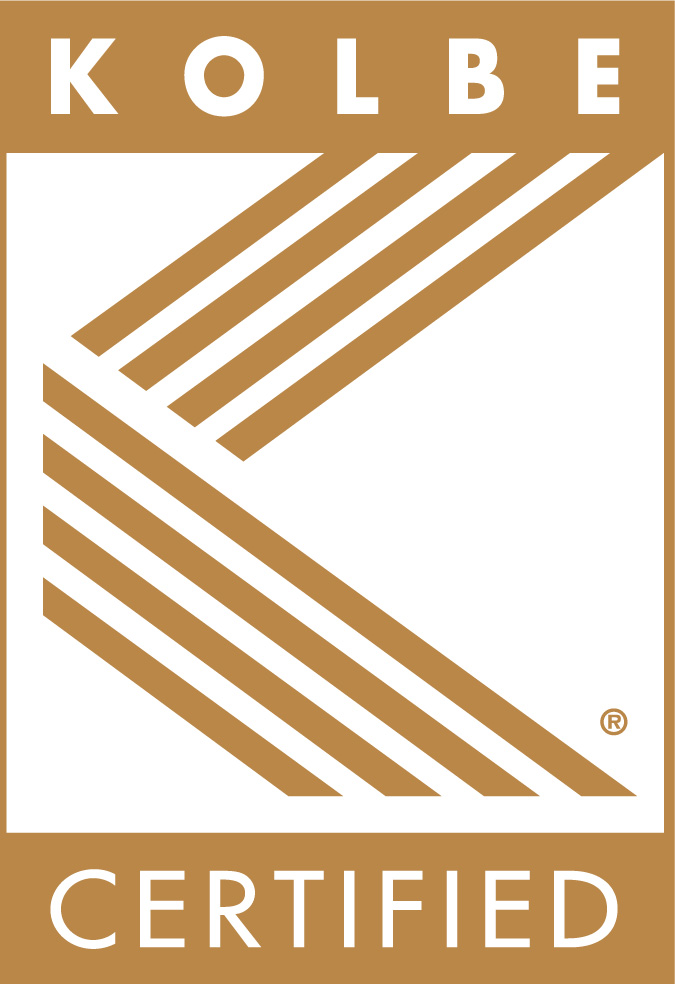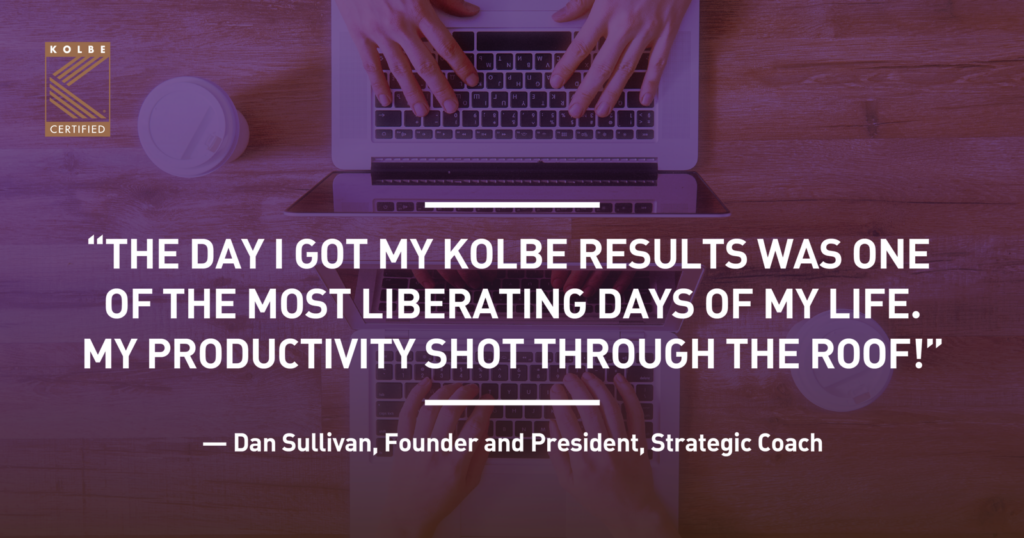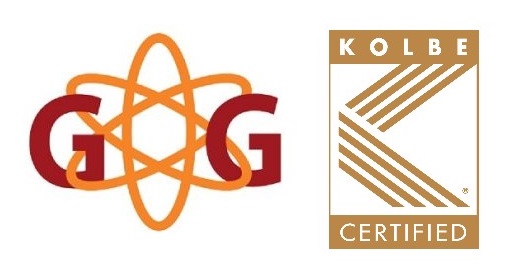Do More. More Naturally.

We tap into what works for you.
The Kolbe System™
Kolbe Corp’s unique approach to improving productivity and performance is based on a solid foundation of research and practical application with a proven track record of more than 40 years. Focusing on people’s innate problem-solving instincts sets the Kolbe System apart, and it meets the standards of the American Psychological Association for validity and reliability as well as race, gender and age neutrality.

Assessments have historically focused on measuring the cognitive (IQ) and the affective (personality) parts of the mind. While this can be helpful in selecting, training and managing people, they only offer a partial picture of a person’s full potential. IQ scores are influenced by opportunities to learn, and being smart doesn’t necessarily predict success. Personality traits are situational, and people who seem agreeable don’t always do a job successfully or accomplish team goals.
“Prescription without diagnosis is malpractice.” Before we develop a coaching strategy, let’s determine exactly what is holding you back. Most people know about the two parts of the mind that most assessments measure:
- Cognitive mind defines your “intelligence.” All that you have learned, your skills, knowledge, expertise, habits, etc. fall into this aspect of mind. Most all cognitive challenges are corrected through training. With rare exception, my clients have the cognitive skill (or capability) to do their job, so we rarely assess this aspect of mind.
- Affective mind deals with emotions, preferences, values, attitudes. Using emotions effectively (EQ) is an indications of affective strength. If a client has negative thoughts, feelings, beliefs that are barrier to success; NLP tools are typically the resource for corrective actions.
And then there is the third part – the driving energy that is instinctive in all of us…
- Conative mind contains the instincts and innate attributes that define your natural method of operation (MO). When you work in your natural style, you are more productive, more comfortable and more successful. We identify people’s instinctive strengths, explain them, analyze how they align with tasks and other people, and offer practical solutions for putting them into practice — from doing better in a job, to team performance, to personal relationships.
Watch this short video for a general overview of Kolbe

Three Basic Assessments that can make a world of difference for you, your business, and your family.
Kolbe A™ Index: How you see yourself. There’s a part of the mind that you don’t hear a lot about. It’s what some people call “instincts” or that “gut feeling” when you’re making a decision. Kolbe’s secret: they know what natural strengths/instincts you were born with and how you can use them to be the most productive, stress-free version of yourself.
Have you found yourself at times operating in “the zone?” Have you experienced the freedom to make decisions or solve problems in a way that was natural to you – and perhaps contrary to the way others approach things? It was then that you were following your natural instincts… operating according to your own conative talents. The Kolbe A Index identifies your natural talents allowing you to be in the zone with intention. And, moreover, when you know the Kolbe A of your family, coworkers, etc., you will find communication improves because you understand each other’s instinctive way of doing things.
Do you work closely with someone on a regular basis? Would you like to improve communication and the quality of your relationships at home and at work? The Kolbe Comparisons: A to A™ and consultation will provide you, and your counterpart, with valuable insights about potential conflict points and great tips on how to work together – so you can both play to your natural strengths with greater consistency and far less conflict.
Kolbe B™ Index: How you see your job. The Kolbe B Index measures an individual’s perception of their own job responsibilities. Comparing Kolbe A™ and Kolbe B results helps job holders recognize when they are trying to perform contrary to their natural strengths and abilities. So much job-related stress occurs because people try to change themselves to meet the requirements of the job.
What would happen if we were to adjust the position to better fit the instinctive talents of the person doing the job? If you were free to be yourself, how might you go about your job differently? The Kolbe B™ Index can identify where you could make adjustments in your day-to-day so that you are free to do the job your way. Would stress diminish and productivity improve? How might this affect turnover, absenteeism, and overall employee morale…
Kolbe C™ Index: How others (supervisor, manager, boss) sees a particular position. The Kolbe C Index measures the functional expectations of a specific position. Comparing Kolbe A™ and Kolbe C results helps supervisors and jobholders see how the jobholder’s strengths line up with the demands of the job and identifies areas of conative stress. It is also a part of the Kolbe Hiring Process.
When a gap exists between job descriptions and expectations, tension arises. Imagine if, along with a clearly defined job description and metrics for success, you were clear on what the instinctive requirements were for the position. How would performance increase with an applicant who is matched to the job in all aspects of mind: skill, personality, and instinct?
For more about how Kolbe can help you grow your business, hire the right people, increase productivity, and reduce turnover, watch this short video and then CONTACT US
Resources to learn more about what Kolbe can do for you

Learn more about how the Kolbe System™ can help you and/or your team. Contact George Gillas today.
Click on the titles below for downloadable PDF
Get Maximum Productivity From Teams
The Kolbe A™ Index, Kolbe B™ Index, Kolbe C™ Index, Kolbe System™, and Comparisons: A to A™ are the trademarks of Kathy Kolbe and Kolbe Corp. All rights reserved. Used herein with permission.
